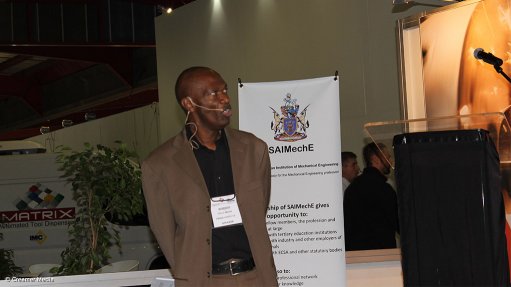
Productivity South Africa value chain competitiveness executive manager Sello Mosai
To enhance industrial capabilities and ensure job creation in South Africa, government aims to adopt a strategy to leverage the scrap metals produced by and belonging to the State and State-owned companies to enhance the competitiveness of the local steel industry.
This is according to Department of Trade and Industry (DTI) capital equipment director and National Tooling Initiative Programme (NTIP) manager Bonginkosi Mamba, who was addressing delegates of the South African Institution of Mechanical Engineering seminar at the 2017 Machine Tools Africa trade show, on Tuesday.
He said this would be done in conjunction with the department reviewing construction notes for streamlining and maximising local content thresholds to enhance local manufacturing.
Mamba further commented that, within the metals sector, the DTI was currently undertaking a study about whether to designate pipe fittings and specialised pipes; pumps and medium-voltage motors; switchgears; port equipment such as stackers, reclaimers, shiploaders and tippers; as well as aluminium castings.
He pointed out that a number of companies had recently revamped their manufacturing facilities with environmental "state-of-the-art" equipment to gear themselves towards meeting the local content requirements for designated products.
SUPPORTING INDUSTRY
Mamba noted that government had put in place a number of measures to support the local manufacturing sector. These included supporting competitiveness and technological enhancements through interventions such as the National Foundry Technology Network and the Black Industrialists Programme, while policy instruments included local content requirements and the imposition of tariffs on imports.
"The DTI is assisting the manufacturing sector by building capacity through industry-wide collaboration and in conjunction with the Department of Higher Education and Training as well as industry."
He added that the South Africa infrastructure build programme including the Strategic Integrated Projects, presented the largest single opportunity to stimulate the industry by backing the implementation of localisation requirements and focused supplier development programmes to enhance the competitiveness of the local supply industry.
"Significant investment in rail networks and infrastructure on the African continent is expected to increase the demand for locomotives and wagons. Additionally, the African Union's pronouncements on South Africa becoming a rail centre of excellence for the continent could provide a crucial platform to deepen South Africa's rail manufacturing capabilities," Mamba added.
Moreover, he highlighted that the outcomes of the Mining Phakisa initiative were expected to unlock growth and development opportunities in the mining sector, which would positively impact the downstream manufacturing sector.
Mamba mentioned that the move towards a more "green economy" also presented an opportunity to implement energy saving measures in the manufacturing sector, which would move it towards complying with environmental requirements.
SECTOR STATUS AND OUTLOOK
Meanwhile, Productivity South Africa value chain competitiveness executive manager Sello Mosai in his address to the seminar noted that despite the depressed economic climate that persisted in 2016, the South African manufacturing sector managed to record marginal growth of 0.8%.
He pointed out that there was room for optimism as the sector was expected to grow by 0.5% this year and by 1.2% in 2018.